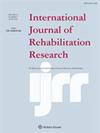影响75岁以上急性康复患者全膝关节置换术后短期功能恢复的因素
IF 1.5
4区 医学
Q3 REHABILITATION
International Journal of Rehabilitation Research
Pub Date : 2022-09-01
Epub Date: 2022-07-01
DOI:10.1097/MRR.0000000000000538
引用次数: 0
摘要
老年患者全膝关节置换术(TKA)后的强化康复对短期内活动能力和日常生活活动的改善至关重要。我们的目的是研究多学科康复的有效性,并评估75岁以上急性后护理TKA患者功能增强的早期术后预测因素。本研究包括190例急性后康复医院收治的原发性TKA患者。主要结果测量指标为功能独立性运动分量测量(M-FIM)、M-FIM有效性、数值评定量表、膝关节伸展强度和活动范围、10米步行测试、Berg平衡量表(BBS)和迷你精神状态检查(MMSE)。患者年龄≥75岁(n = 105)和本文章由计算机程序翻译,如有差异,请以英文原文为准。
Factors affecting short-term functional gain following total knee arthroplasty in patients aged from 75 years at a postacute rehabilitation setting.
The intensive rehabilitation of older patients after total knee arthroplasty (TKA) is vital for short-term improvement in mobility and daily living activities. We aimed to investigate the effectiveness of multidisciplinary rehabilitation and assess the early postoperative predictors that are associated with functional gain in TKA patients aged from 75 years in a postacute care setting. This study included 190 patients following primary TKA who were admitted at the postacute rehabilitation hospital. The main outcome measures were the motor component of functional independence measure (M-FIM), M-FIM effectiveness, numerical rating scale, knee extension strength and range of motion, 10-m walk test, Berg balance scale (BBS), and mini-mental state examination (MMSE). The functional gain between patient age groups of ≥75 (n = 105) and <75 (n = 85) years were compared. Although patients aged ≥75 years showed lower improvement in BBS score compared with <75 years, the M-FIM gains and other physical functions were similar in both age groups. In multivariate analysis, the results for M-FIM at admission (β: −0.703; P = 0.001), BBS (β: 0.342; P = 0.032) and MMSE (β: 0.446; P = 0.021) were independently associated with functional gain in the patients following TKA aged ≥75 years. Multidisciplinary inpatient rehabilitation was beneficial for basic functional gain except for improvement in balance ability in patients after TKA aged ≥75 years. Functional level, balance ability and cognitive status in the early postoperative period can be useful predictors for short-term functional gain in the postacute care phase.
求助全文
通过发布文献求助,成功后即可免费获取论文全文。
去求助
来源期刊

International Journal of Rehabilitation Research
REHABILITATION-
CiteScore
3.10
自引率
0.00%
发文量
88
审稿时长
6-12 weeks
期刊介绍:
International Journal of Rehabilitation Research is a quarterly, peer-reviewed, interdisciplinary forum for the publication of research into functioning, disability and contextual factors experienced by persons of all ages in both developed and developing societies. The wealth of information offered makes the journal a valuable resource for researchers, practitioners, and administrators in such fields as rehabilitation medicine, outcome measurement nursing, social and vocational rehabilitation/case management, return to work, special education, social policy, social work and social welfare, sociology, psychology, psychiatry assistive technology and environmental factors/disability. Areas of interest include functioning and disablement throughout the life cycle; rehabilitation programmes for persons with physical, sensory, mental and developmental disabilities; measurement of functioning and disability; special education and vocational rehabilitation; equipment access and transportation; information technology; independent living; consumer, legal, economic and sociopolitical aspects of functioning, disability and contextual factors.
 求助内容:
求助内容: 应助结果提醒方式:
应助结果提醒方式:


